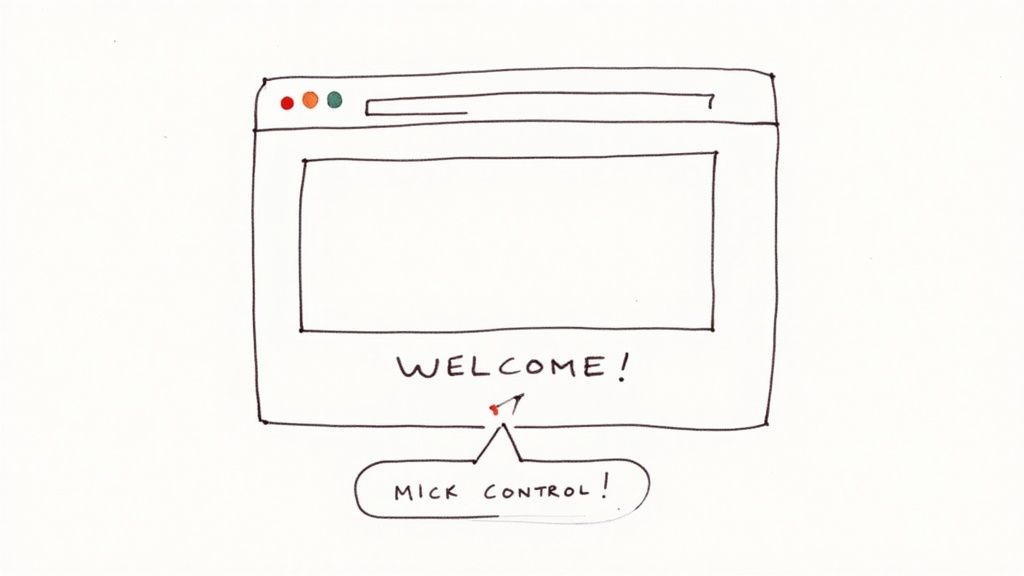
direct bookings
Direct bookings: advantages for small vacation rentals
Posted on Nov 4, 2025

Navigating the vacation rental market often feels like playing by someone else's rules. Massive online travel agencies (OTAs) like Airbnb and Booking.com offer incredible visibility, but they come at a steep price: high commissions, limited control, and a constant battle against algorithm changes. For small vacation rental businesses, this dependency can stifle growth and severely cut into profits.
But what if there was a better way to build a sustainable, profitable, and resilient business? The answer lies in shifting your focus toward securing direct bookings. This strategy is not just about saving on fees; it's a fundamental move towards independence, brand ownership, and creating deeper, more valuable connections with your guests.
By taking this path, you regain command over every aspect of your operation, from pricing and policies to the guest experience itself. In this comprehensive guide, we'll explore the transformative power of this approach and answer the critical question: what are the advantages of direct bookings for small vacation rental businesses? We will unpack seven key benefits, providing actionable insights to help you take back control, build lasting guest relationships, and maximize your success.
1. Higher Profit Margins Through Commission Elimination
The most immediate and significant advantage of direct bookings for small vacation rental businesses is the dramatic increase in profit margins. Online Travel Agencies (OTAs) like Airbnb, Vrbo, and Booking.com provide immense visibility, but this exposure comes at a steep price. These platforms typically charge commission fees ranging from 15% to as high as 25% on every single reservation. By processing bookings directly through your own website, you eliminate these third-party fees entirely, allowing you to retain 100% of the revenue.
For small businesses operating on tight margins, this is a game-changer. Consider a mountain cabin rental business in a popular destination like Aspen that generates $100,000 in annual booking revenue. A 15% commission fee to an OTA would mean handing over $15,000. That is $15,000 that could otherwise be reinvested into property upgrades, marketing efforts, or simply taken as profit. Direct bookings transform this commission expense directly into bottom-line revenue.

Actionable Steps to Eliminate Commissions
Implementing a direct booking strategy is more accessible than ever. Independent property owners in vacation hotspots like Sedona, or small beach cottage operators, can leverage a few key tools to reclaim their revenue.
- Integrate a Booking Engine: Add a simple, user-friendly booking engine to your existing website. Many property management systems (PMS) like Hostaway or OwnerRez offer widgets that can be easily embedded into WordPress or Squarespace sites.
- Set Up Secure Payments: Use trusted payment processors like Stripe or Square to handle transactions securely. These services integrate seamlessly with most booking engines and provide guests with a professional and safe checkout experience.
- Incentivize Direct Bookings: Encourage guests to book directly by offering a small discount, such as 3-5% off the total price. This still leaves you with significantly more profit than you would make through an OTA, while making the guest feel like they've secured an exclusive deal.
This approach is particularly effective when you have a base of repeat guests or a strong local brand presence. By focusing on retaining a larger portion of each booking, you build a more sustainable and profitable business model, answering the crucial question of "what are the advantages of direct bookings for small vacation rental businesses?" with a clear financial benefit.
2. Complete Control Over Guest Experience and Brand Messaging
Beyond financial gains, direct bookings empower small vacation rental businesses with complete control over their brand identity and the end-to-end guest experience. On OTAs, your property is presented within a standardized, restrictive template, forced to compete with countless others on price and basic amenities. A direct booking website liberates your brand, allowing you to tell a compelling story, showcase your unique value proposition, and communicate directly with guests on your own terms.
This control extends to every touchpoint, from the initial discovery phase to post-stay follow-up. For instance, unique properties like farm stays or eco-lodges can use their websites to detail their commitment to sustainability or highlight authentic local experiences, attracting guests who share those values. This ability to cultivate a distinct brand and foster genuine connections is a significant answer to the question of "what are the advantages of direct bookings for small vacation rental businesses?" as it builds loyalty that transcends transactional relationships.

Actionable Steps to Curate Your Brand Experience
Building a powerful brand identity and a seamless guest journey is achievable for any small operator. Whether you manage a portfolio of luxury villas or a single charming cottage, these steps can help you take control.
- Develop a Unique Brand Voice: Create a brand guide that defines your communication style. Is your brand playful and casual, or sophisticated and luxurious? Ensure this voice is consistent across your website copy, emails, and social media.
- Invest in High-Quality Visuals: Use professional photography and videography to showcase your property's best features. Unlike the small, compressed images on OTAs, your own site can feature stunning, high-resolution galleries and virtual tours.
- Personalize Guest Communications: Implement a CRM or use your PMS to track guest preferences. Send personalized welcome messages, provide curated local recommendations, and remember past guests' needs to encourage repeat visits. Part of providing a superior guest experience and protecting your asset involves implementing robust security measures. With direct bookings, you maintain complete control over decisions such as deploying robust small business security systems to ensure peace of mind for both you and your guests.
This level of control is essential for building a memorable brand that stands out in a crowded market. By curating every aspect of the guest journey, you create loyal advocates for your business, not just one-time renters sourced from a massive platform.
3. Increased Guest Loyalty and Repeat Booking Rates
Beyond the initial financial gain, one of the most powerful long-term advantages of direct bookings is the ability to foster genuine guest loyalty and drive repeat business. When a guest books through an OTA, the relationship is transactional and mediated by the platform. Direct bookings, however, shift this dynamic, allowing you to build a personal connection and own the entire guest experience from start to finish. This direct relationship is the foundation for turning one-time visitors into lifelong advocates for your brand.
Nurturing these relationships allows small vacation rental businesses to bypass the competitive noise of OTA marketplaces. A lakeside cabin rental owner in the Poconos can cultivate a list of past guests who are far more likely to return than a new traveler scrolling through hundreds of listings on Vrbo. Studies consistently show that repeat guests not only book more frequently but also tend to stay longer and become valuable referral sources, significantly boosting customer lifetime value and creating a more predictable revenue stream.
Actionable Steps to Foster Loyalty
Building a loyal guest base is about creating personalized, memorable experiences that OTAs cannot replicate. Small property managers, from coastal condo owners in Florida to boutique urban apartment operators, can implement simple yet highly effective strategies.
- Implement a Loyalty Program: Create a simple, tiered program to reward returning guests. Offer tangible benefits like a "5th night free" promotion after four stays, or provide anniversary rate discounts to celebrate their first visit.
- Personalize Communications: Use a CRM or your property management system to keep detailed notes on guest preferences. Sending a personalized birthday or anniversary email with a special offer shows you value their business beyond a single transaction. For more guidance on this, you can explore detailed strategies on how to craft effective guest rebooking emails.
- Offer Exclusive Return-Guest Perks: Incentivize repeat bookings by providing value that isn't available on OTAs. This could include a 10-15% discount for booking more than six months in advance, a complimentary bottle of local wine upon arrival, or free late checkout.
By directly managing the guest relationship, you gain complete control over communication and marketing. This control is crucial for building a brand that guests trust and return to, directly answering "what are the advantages of direct bookings for small vacation rental businesses?" with the promise of sustainable, long-term growth.
4. Valuable Guest Data and Business Intelligence
One of the most powerful, yet often overlooked, advantages of direct bookings is the direct access to valuable guest data. When a guest books through an OTA, the platform acts as a gatekeeper, often obscuring crucial information like email addresses, booking patterns, and demographic details. By managing your own bookings, you gain ownership of this first-party data, transforming raw information into actionable business intelligence.
This data is a goldmine for small businesses. For example, a vineyard-adjacent rental in Napa Valley might discover that the majority of their direct bookings are from couples celebrating anniversaries during the fall harvest season. This insight allows them to create targeted marketing campaigns and anniversary-themed packages. Similarly, analyzing guest feedback can reveal that guests consistently praise the new hot tub, justifying the investment and highlighting it in future marketing materials. This direct line to your guests' needs and behaviors is a critical competitive edge.

Actionable Steps to Leverage Guest Data
Collecting and analyzing data doesn't require a team of analysts. Small operators can implement simple, effective strategies to make data-driven decisions that enhance the guest experience and boost revenue.
- Track Visitor Behavior: Use free tools like Google Analytics on your direct booking website to understand where your visitors are coming from, which pages they view most, and where they drop off in the booking process.
- Implement Post-Stay Surveys: Send a simple automated email with a one-to-two question survey after checkout. Ask guests what they loved and what could be improved to gather direct, honest feedback for future enhancements.
- Analyze Booking Patterns: Keep a simple spreadsheet or use your property management system to track guest type (e.g., family, couple), booking source, and length of stay. This helps you identify trends, like discovering that weekend rates can command a 30% premium during specific seasons.
Leveraging these insights is a core reason why business owners seek out direct vacation rental software, as it provides the foundation for building a robust, independent operation. By understanding your guests on a deeper level, you can tailor your offerings, refine your marketing, and optimize your pricing strategy, directly answering "what are the advantages of direct bookings for small vacation rental businesses?" with improved operational intelligence. Learn more about the best software for direct bookings.
5. Flexibility to Implement Dynamic Pricing and Revenue Optimization
One of the most powerful advantages of direct bookings for small vacation rental businesses is the complete control it provides over your pricing strategy. While OTAs offer some automated pricing tools, they often come with limitations and are designed to benefit the platform's overall market goals. A direct booking channel empowers you to implement sophisticated, real-time revenue management strategies tailored precisely to your property, location, and financial goals. This agility is key to maximizing income throughout the year.
This means you are no longer bound by platform-wide algorithms or rate parity clauses. You can instantly adjust your prices to capitalize on sudden spikes in demand, such as a local music festival announcement, or to attract last-minute travelers during a slow week. For a small ski chalet operator in a resort town like Breckenridge, this could mean raising rates by 50% for a holiday weekend or offering a special "book 4 nights, get the 5th free" package during the shoulder season, tactics that are often cumbersome or impossible to execute on major OTAs.
Actionable Steps for Revenue Optimization
Unlocking the full potential of dynamic pricing requires a proactive approach and the right tools. Smart pricing isn't just about raising rates; it's about finding the optimal price point for every single night of the year.
- Leverage Revenue Management Software: Integrate a specialized tool like PriceLabs or Wheelhouse with your direct booking engine. These platforms analyze market data, local events, and competitor pricing to suggest daily rate adjustments, automating a complex process and maximizing your revenue potential.
- Implement Strategic Rule Sets: Create pricing rules to capitalize on booking patterns. For example, set higher rates and minimum stay requirements (e.g., 3-4 nights) for peak season weekends. Conversely, offer a 20% mid-week discount from Monday to Thursday to attract digital nomads or flexible travelers.
- Create Targeted Promotions: Use your freedom to create compelling offers that appeal to specific guest segments. For example, offer an early-bird discount of 15% for guests who book their summer vacation 6 months in advance or create a "flash sale" for any unsold nights within the next 7 days. For a deeper dive, you can learn more about vacation rental revenue management on gethostai.com.
By taking control of your pricing, you directly influence your occupancy and profitability, making this a critical answer to the question, "what are the advantages of direct bookings for small vacation rental businesses?"
6. Reduced Dependency on Third-Party Platform Algorithm Changes
Relying solely on OTAs like Airbnb or Vrbo places your business at the mercy of their ever-changing algorithms and policies. These platforms can, and often do, update their systems without warning, which can cause your property's search ranking to plummet overnight, severely impacting visibility and bookings. Direct bookings provide a crucial layer of stability, insulating your revenue stream from this third-party volatility.
This "digital landlord" dynamic means a small policy adjustment can have a massive financial impact. For instance, Airbnb's algorithm updates in 2023 were perceived by many hosts to favor larger, professionally managed properties, causing smaller operators to lose visibility. Similarly, a sudden increase in Booking.com's commission structure could instantly erode your profitability. By building your own direct booking channel, you control your own destiny and are not subject to the whims of an external platform. This independence is a key answer to "what are the advantages of direct bookings for small vacation rental businesses?".
Actionable Steps to Build Business Independence
For small business owners, from a single ski chalet operator to a manager of several coastal condos, creating a buffer against platform risk is essential for long-term survival and growth. This is not about abandoning OTAs, but about building a resilient, multi-channel strategy.
- Build Your Email List: Proactively collect email addresses from every guest. Use this list to send newsletters, special offers, and reminders to book directly for their next trip. An owned audience is your most powerful marketing asset.
- Invest in Your Own Website's SEO: Focus on search engine optimization (SEO) for your direct booking website. Targeting keywords like "[your city] vacation rental" or "[your property type] in [your location]" helps you attract organic traffic that is not funneled through an OTA.
- Diversify and Set a Goal: While building your direct channel, maintain a presence on multiple OTAs to avoid single-platform dependency. Set a tangible goal, such as aiming to generate 50% of your bookings directly within two years.
This strategic approach ensures that even if an OTA algorithm change negatively affects your listing, you have a separate, reliable stream of income. You can invest in marketing and property improvements with confidence, knowing your business foundation is secure and not built on borrowed land.
7. Enhanced Ability to Offer Personalized Amenities and Experiences
Direct booking relationships unlock a powerful competitive advantage: the ability to offer deeply personalized amenities and unique local experiences. While OTAs excel at transactional bookings, they create a barrier that prevents hosts from understanding and catering to individual guest needs pre-arrival. By establishing a direct line of communication, you can move beyond simply providing accommodation and begin curating memorable stays that differentiate your property and justify premium pricing.
This direct connection allows you to gather information about your guests' interests, the purpose of their trip, and any special occasions they might be celebrating. Imagine a wine country property owner who, after a direct conversation, arranges for a sommelier-curated selection of local wines to be waiting in the rental. Or a beach property manager who bundles surfing lessons and reservations at a sought-after restaurant for a guest celebrating an anniversary. These bespoke touches are difficult to coordinate through the rigid framework of an OTA and are a key reason why direct bookings for small vacation rental businesses are so valuable.

Actionable Steps to Personalize Guest Stays
Leveraging this advantage requires a proactive approach to guest communication and local partnerships. Small operators, from farm stays to mountain cabins, can implement these strategies to create unforgettable experiences.
- Partner with Local Businesses: Forge relationships with local tour operators, chefs, spas, and artisans. You can offer their services as add-ons, often for a small commission, creating a new revenue stream while enhancing the guest experience. For example, a property near a national park could partner with an expert guide for private hiking tours.
- Create Tiered Experience Packages: Develop a menu of experiences that guests can add to their booking. A "Standard" package might include a welcome basket with local snacks, while a "Luxury" package could feature a private cooking class using produce from your property's garden.
- Utilize Pre-Arrival Questionnaires: Once a direct booking is confirmed, send a brief, friendly questionnaire. Ask about dietary preferences, interests (e.g., hiking, art, food), and the reason for their visit. Use these insights to tailor their welcome amenity or suggest specific activities.
This level of personalization not only elevates the guest experience but also generates rave reviews and powerful word-of-mouth marketing. It showcases one of the most compelling answers to "what are the advantages of direct bookings for small vacation rental businesses?" by turning a simple stay into a cherished memory.
Direct Booking Advantages — 7-Point Comparison
| Item | Implementation Complexity | Resource Requirements | Expected Outcomes | Ideal Use Cases | Key Advantages |
|---|---|---|---|---|---|
| Higher Profit Margins Through Commission Elimination | Medium — build direct booking site and payment flow | Booking engine, payment processor (Stripe/Square), dev/time | Higher net revenue per booking; estimated $1.5k–$5k+ annual savings/property | Small owners with thin margins and steady demand | Retain full booking revenue; predictable finances; pricing flexibility |
| Complete Control Over Guest Experience and Brand Messaging | Medium — branding, site content, CRM setup | Design/photography, CRM/email tools, marketing time | Stronger brand identity; improved guest relationships and repeat bookings | Luxury or unique properties emphasizing storytelling | Full brand control; personalized communications; differentiation |
| Increased Guest Loyalty and Repeat Booking Rates | Medium — loyalty program and automation setup | CRM, email automation, loyalty budget, staff time | Higher repeat rates (≈20–40%); increased customer lifetime value | Properties with returning-guest potential or local repeat market | Higher CLV; lower acquisition cost; more predictable revenue |
| Valuable Guest Data and Business Intelligence | Medium–High — analytics and data workflows | Analytics tools, data storage, technical/analyst skills, compliance | Actionable insights for pricing, marketing, amenities and seasonality | Multi-property managers or owners focused on optimization | First-party insights; targeted marketing; informed investments |
| Flexibility to Implement Dynamic Pricing and Revenue Optimization | High — pricing systems or specialist expertise | Revenue management software/analyst, market data, monitoring time | Revenue uplift (≈15–30%); improved RevPAR without raising occupancy | High-demand, event-driven, or price-sensitive markets | Real-time rate control; maximize revenue; respond to demand shifts |
| Reduced Dependency on Third-Party Platform Algorithm Changes | Medium — build independent channels and marketing | SEO, email list, advertising budget, diversified listings | Greater booking stability; lower exposure to platform policy/algorithm risk | Hosts overly reliant on single platforms seeking resilience | Business stability; reduced fee vulnerability; predictable flow |
| Enhanced Ability to Offer Personalized Amenities and Experiences | Medium — curate partners and personalize offerings | Local partnerships, inventory/cost for amenities, coordination effort | Premium positioning; higher reviews; ability to charge premium rates | Boutique, experiential, or high-end properties | Differentiation via experiences; higher perceived value; stronger reviews |
Your Next Step: Building a Thriving Direct Booking Business
Transitioning from a heavy reliance on online travel agencies to a robust direct booking strategy is not merely a tactical shift; it is a fundamental transformation in how you operate, grow, and define your vacation rental business. Throughout this article, we've explored the significant advantages of direct bookings for small vacation rental businesses, moving far beyond simple commission savings. The journey begins with reclaiming your profit margins but quickly expands into building a resilient, independent, and guest-centric brand.
The power lies in taking back control. You regain full authority over your brand messaging, the guest experience from the first click to checkout, and the invaluable data that informs every strategic decision. This control is the foundation for creating something truly special: a hospitality business that guests don't just book, but actively seek out and return to. By fostering direct relationships, you transform one-time visitors into loyal advocates, creating a sustainable and predictable revenue stream that is insulated from the unpredictable whims of OTA algorithms.
Key Takeaways for Your Direct Booking Strategy
As you move forward, focus on these core principles that encapsulate the most critical advantages:
- Financial Autonomy is Paramount: The elimination of hefty commission fees directly translates to a healthier bottom line. This extra capital isn't just profit; it's fuel for reinvestment into property upgrades, marketing initiatives, and enhanced guest amenities that further strengthen your direct booking appeal.
- Your Brand is Your Greatest Asset: Direct bookings empower you to tell your own story. You control the narrative, the policies, and the entire guest journey, ensuring every interaction reflects the unique quality and personality of your properties.
- Data is the Engine of Growth: Owning your guest data provides a clear roadmap. It allows you to understand booking patterns, guest preferences, and marketing effectiveness, enabling you to make smarter, data-driven decisions that optimize revenue and guest satisfaction.
Actionable Next Steps to Build Momentum
The path to a thriving direct booking channel is built one step at a time. Start with a focused, manageable approach:
- Establish Your Digital Home Base: Create a professional, user-friendly website with an integrated booking engine. This is your non-negotiable first step to capturing direct traffic.
- Focus on the Guest Experience: Delight your current guests. A memorable stay is the most powerful catalyst for repeat bookings and word-of-mouth referrals.
- Implement a Simple Email Strategy: Begin collecting guest emails and send simple, valuable communications like post-stay thank-you notes with a special offer for a future direct booking.
Embracing these advantages of direct bookings for small vacation rental businesses is about more than just boosting profits; it's about building a legacy. It's about creating a brand that stands on its own, celebrated for its unique character and exceptional service. By taking these deliberate steps, you are not just securing a booking; you are cultivating a relationship and future-proofing your business in an ever-evolving industry.
Ready to unlock the full potential of your direct booking strategy? hostAI provides the intelligent tools you need, from AI-powered website creation with hostFront to automated guest communication with hostMail. See how hostAI can help you build a more profitable and resilient vacation rental business today.